Skylab Launched

The United States launches Skylab One, its first manned space station. It is the last launch of the Saturn V rocket, and the the largest payload ever launched into space at the time. Skylab will fall back into the Earth’s atmosphere in July 1979.
System 7 Released
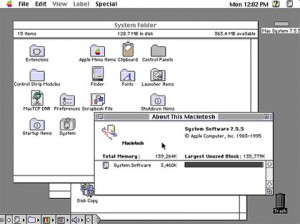
The System 7 operating system for the Macintosh is released, the second major upgrade to the Mac OS since 1984. One of the major features included in System 7 is built-in cooperative multitasking. System 7 also introduces the concept of “aliases”, which will later be copied as “shortcuts” in Microsoft Windows 95. System 7 was the first Mac OS that I personally became familiar with, and it was the foundation of future Mac OS versions until the release of Mac OS X almost exactly 10 years later.
Money For Nothing?

The British rock band Dire Straits releases their fifth album, Brothers in Arms, which will become the first CD to sell over a million copies. It was the most successful album release on compact disc for over two decades. I guess “Money for Nothing” was more than a song title.
Into the Ether(net)
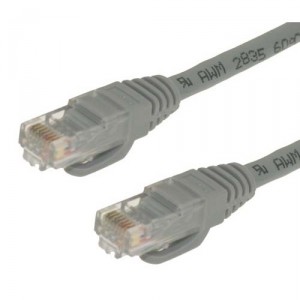
Digital Equipment Corporation, Intel, and Xerox jointly announce the Ethernet network specification. Ethernet is the predominant networking standard of today’s business and home networks.
The Z3
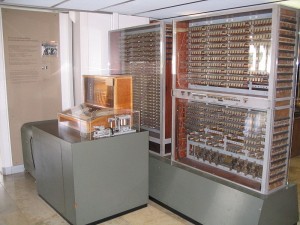
German engineer Konrad Zuse unveils the Z3, now generally recognized as the first fully functional, programmable computer. Because Germany was fighting World War II, not much was known about the Z3 until after the war. It was an electromechanical computer so it was not the world’s first fully electronic computer although plans were made to replace the mechanical relays with fully electronic switches. However, funding was denied by the German government because the Z3 was not considered important to the war effort. The Z3 was destroyed by Allied bombing in 1943 but a fully functioning replica was built in 1961 and is on display in the Deutsches Museum in Munich. Because the Z3 was the first programmable, fully automatic computer, some people consider Konrad Zuse the inventor of the modern computer.
Deep Blue Defeats Kasparov in Tournament Match
The IBM computer and artificial intelligence Deep Blue defeats reigning chess champion and one of the greatest chess players of all time, Garry Kasparov, in the 6th and deciding game of a tournament match, thus becoming the first time a computer defeated a chess champion in match play. A year earlier, Deep Blue had bested Kasparov in 2 individual games but Kasparov eventually won the match 4-2. This time, after being reprogrammed and upgraded, the 1997 Deep Blue, capable of calculating 200 million moves per second, won 2 matches out of 6 vs Kasparov’s 1 victory and 3 draws. After the defeat Kasparov asked for a rematch but IBM declined and retired Deep Blue.
The defeat of a reigning chess champion at the hands of artificial intelligence made headlines around the world and marked a milestone in the development of AI and machine learning. From this early landmark moment, the advancement of computing power and machine learning has created even more powerful artificial intelligence. Kasparov in 2016 stated that “Today you can buy a chess engine for your laptop that will beat Deep Blue quite easily”.
Honestly, I don’t see what the big deal is. Chess computers had been wiping the floor with me since I was in kid in the 80’s!
VisiCalc Demoed at West Coast Computer Faire
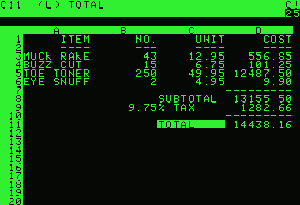
At the West Coast Computer Faire, Harvard MBA candidate Daniel Bricklin and programmer Robert Frankston give one of the first private demonstrations of VisiCalc, the original spreadsheet software. It would later be publicly demoed for the first time at the National Computer Conference in June of that year.
First released for the Apple II, VisiCalc made a business machine of the personal computer. VisiCalc was a huge success, selling more than 100,000 copies in the first year. VisiCalc also spurred the sales of the Apple II, as people would buy the Apple II just to run VisiCalc. Overall, the spreadsheet validated the usefulness of the home computer and was likely a major factor for IBM accelerating their entry into the PC market.
The Birth of Wireless
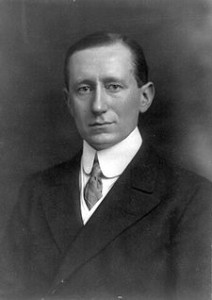
“Wireless” is born when Guglielmo Marconi sends a radio wave three-quarters of a mile. Three years later the Marconi Company will successfully communicate “ship to shore” over a distance of twelve miles. Marconi’s work leads to the commercialization and proliferation of most of the radio technologies we know today.
Linux Gets Happy Feet
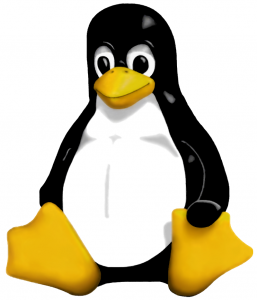
Linus Torvalds describes in an e-mail to a mailing list his conception of what he believes should be the logo for the Linux operating system. This is what soon becomes Tux the penguin, the “brand character” for Linux. Perhaps had he known the movie Happy Feet would be released a little over 10 years later, he would have chosen a Warbler instead.
Germans Can Be So Dry

German scientist, Dr. Carl Gassner, is issued a German patent for the first “dry” cell battery, which uses zinc as its primary component. A U.S. patent will be issued to Gassner in 1887. Unlike previous wet cells, this dry cell is more solid, does not require maintenance, does not spill, and can be used in any orientation. Gassner’s development led to the production of the first convenient battery for widespread use and the invention of the flashlight. Gassner’s design is virtually unchanged in today’s zinc carbon “general purpose” batteries. Although most people use alkalines, in fact zinc carbon batteries will last longer in low drain devices such as remote controls and clocks.

